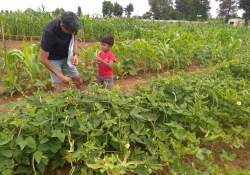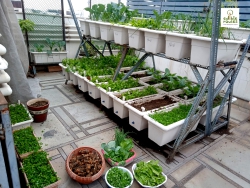Post COVID Food Revolution
Physical
distance in food supply during COVID times has hindered rural-urban
connectivity for domestic trade of food. City dwellers have awakened to the
idea of self-reliance and are finding localised solutions to this challenge.
The Urban Story
The plunder of Corona virus has reinforced the possibilities of balancing the scales of production by allowing food to grow on balconies, rooftops, in community gardens and parks, restaurants and offices. The urban folks have found themselves experimenting with concepts of kitchen gardening and urban farming. The goal of urban farming is to make the city dwellers conscious of living ‘local’. Its goal is to make them aware of the challenges of farming and to take a step towards respecting food and farmers.
History is a testament of innovations in the hardest of times. Threat to survival due to embargos placed on Cuba by the United States in the 1990s resulted in scarcity of food in Cuba. Cuba invented urban farming as the residents were forced to find other means of survival. COVID times have only highlighted the importance of such actions.
Recently, people have shown more affinity to consuming fresh and local fruits and vegetables, and healthier home cooked meals. Maintaining such dietary habits would be beneficial for urban consumers and societal health in the long run. This means that urban consumers have the power to be a part of a long term solution. One of the most important lessons from these times is that the answer is not to try and overpower nature but to rekindle oneness with it.
Implementing Change

The FSSAI handbook ‘Eat Right during COVID 19’ shows that public health sector has the capacity to affect change, but they need to collaborate with all stakeholders of the food system for effective action. The COVID crisis presents a new opportunity and urgency for renewed policy action.
Diversification of market sources and a fair minimum wage for farmers are indispensable steps towards ensuring food security in India. Through networks that consist of farmers, public and private sectors, it would be possible to exchange knowledge and resources to improve our market infrastructure and create an efficient post-harvest value chain. For a successful policy shift, it is important to harness the untapped potential of women entrepreneurs in the rural and urban areas. Producer-consumer relations can be strengthened by capitalising on digital payments and direct sales. Cambodia and Myanmar are successful working examples of such market flexibility.
As Rahm Emmanuel once said “Never Let A Crisis Go To Waste”, it is imperative to exploit the circumstances created by COVID to affect reasonable change in times of hardships. Fortification of urban farming, integration of youth and women in agricultural policies, market transparency and flexibility, and advancements in accessible technology that decrease the proximity between farmers and consumers could be a few components of what a post-COVID resilient food system could look like. ■
Edible Routes
Edible Routes provides services such as designing home kitchen gardens,
farm management, restoration of degraded land, water harvesting etc.
info@edibleroutes.com